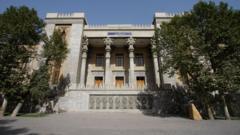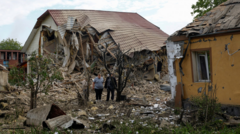Khamenei's remarks come as tensions rise, with Iran rejecting US claims of progress while emphasizing its commitment to peaceful nuclear activities.
**Khamenei Skeptical of US Nuclear Negotiations Yielding Results**

**Khamenei Skeptical of US Nuclear Negotiations Yielding Results**
Iran's Supreme Leader casts doubt on the future of nuclear talks with the United States, citing excessive demands regarding uranium enrichment.
In recent statements, Iran's Supreme Leader Ayatollah Ali Khamenei expressed a deep skepticism about the ongoing nuclear negotiations with the United States, declaring that he does not expect any significant outcome from the talks. Khamenei criticized the US for making "excessive and outrageous" demands concerning uranium enrichment, emphasizing, "We don't think it will lead to any outcome. We don't know what will happen."
US President Donald Trump had previously indicated that Iran had "sort of" agreed to certain terms following a series of discussions mediated by Oman, yet Iranian negotiators quickly countered claims that any agreement would necessitate a halt to the production of enriched uranium. Enriched uranium has dual-use capabilities, serving both as reactor fuel and a potential material for nuclear weapons.
Tensions escalated when Trump, who withdrew the US from the 2015 nuclear deal during his administration, warned Iran that it could face military action from the US and Israel should the negotiations fail. Iran maintains that its nuclear program is strictly peaceful and asserts that it will not pursue nuclear weapons. However, Iran has breached existing limitations from the nuclear deal in response to stringent US sanctions, accumulating stockpiles of highly-enriched uranium that could be used to develop multiple nuclear bombs.
Khamenei delivered his remarks during a ceremony honoring the late President Ebrahim Raisi, who died in a helicopter crash one year ago. He praised Raisi's firm stance against direct negotiations with the US, stating, "He clearly said 'no' without ambiguity," and commended his refusal to allow threats to dictate Iran's negotiating position.
The Supreme Leader criticized the previous negotiations led by Hassan Rouhani, suggesting that they yielded no results and expressing doubt about potential breakthroughs under current chief negotiator Masoud Pezeshkian, who is associated with a reformist ideology. Khamenei admonished the Americans involved in the talks, asserting, "Saying they will not allow Iran to enrich is a big mistake. No one waits for their permission."
US special envoy Steve Witkoff reaffirmed the US position during a recent interview, stating that no enrichment would be permissible. He stressed the importance of achieving a resolution without disrespecting Iran, yet insisted that for the negotiations to progress, a deal excluding enrichment was essential. Witkoff's comments were met with resistance by Iranian Foreign Minister Abbas Araqchi, who accused him of losing touch with the reality of negotiations and declared, "Unrealistic expectations stop negotiations; enrichment in Iran is not something that can be stopped."
The 2015 nuclear agreement reached under the Obama administration required Iran to limit its nuclear activities in exchange for international sanctions relief and allowed inspections by the International Atomic Energy Agency (IAEA). Recent reports indicated that Iran has accumulated nearly 275 kg of uranium enriched to 60% purity, dangerously close to weapons-grade material. As the discussions continue, the complex dynamics surrounding Iran's nuclear ambitions remain a significant obstacle to peace and stability in the region.




















